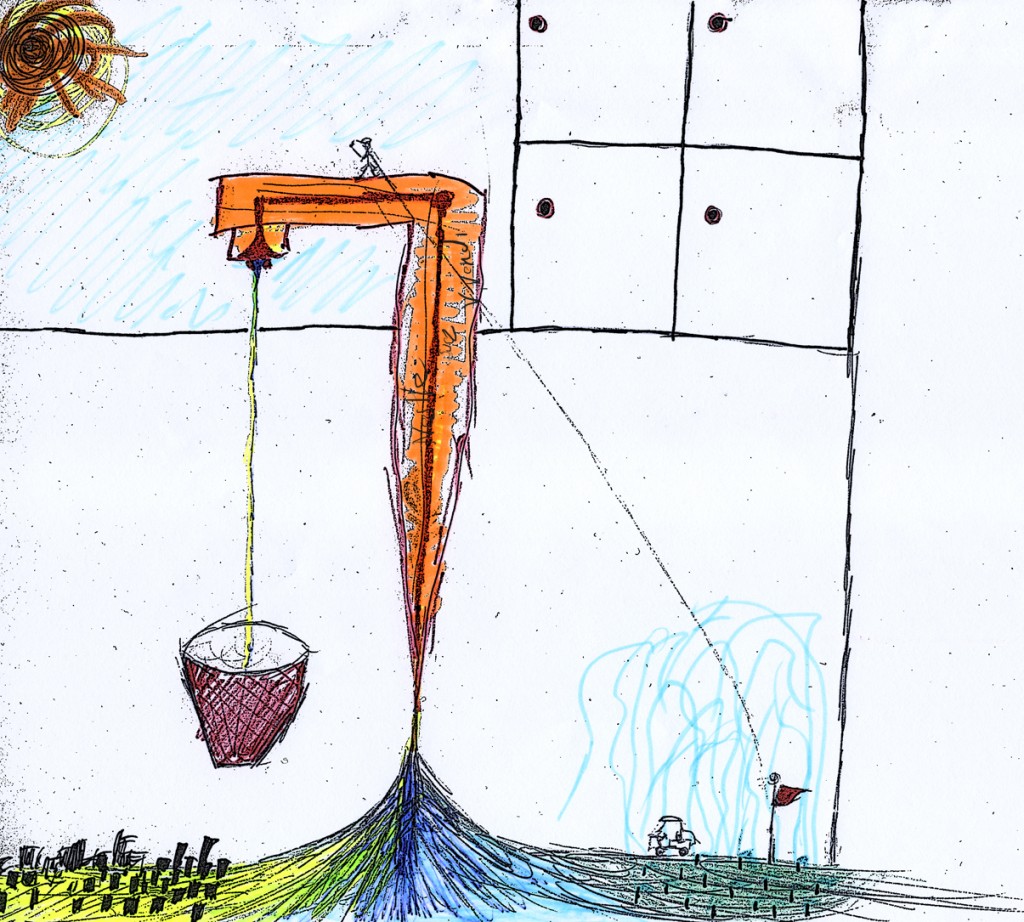Originally published in The Independent at NEIU under the title Detroit and the Crisis of World Water Rights on September 9th 2014. I’ve since lightly edited the piece here and there, most notably adding (lol) after a certain sentence near the end.
There is no greater affront and no greater threat to human rights than water deprivation and privatization. Say what you will about terrorist threats, oil tycoons, militarized police, surveillance or big government—there is no substitute for water—and whoever controls water has unprecedented power over the populace at large.
Ostensibly, “We the People” control water rights under the supervision of our federal and state governments. Private companies such as Nestle, Vivendi, Suez, Thames Water, and Coca Cola—among many others—seek to change that by purchasing from the government the right to sell water from the lakes, rivers, and aquifers of the country. In some cases they have already been successful.
This brings us to modern Detroit, where the taps of low income residents—in predominantly African American communities—run dry for debts as small as $150 to the Detroit water department or, according to Kristian Davis Baley of Ebony.com, for being as few as “two months past due.” Baley also points out, “While individual houses have been cut off, a local golf course owes $200,000, Ford Field is behind $55,000 in payment and Red Wings Stadium is $80,000 behind…”
I admit it’s difficult to see a discrepancy between $150 and $200,000. Just the other day I opened my wallet for a 20 and found 10 grand in hundreds. But this “minor” discrepancy is not really the point: Michigan has, in the last few years, according to Baley, “privatized Detroit’s public transportation and lighting departments, eliminated the human services department…made cuts to EMT and firefighter jobs(…)and announced it [would be] cutting the pensions of city workers.”
It’s not hard to imagine that Detroit’s Water Department might be next in line for privatization. According to Anna Lappet writing for Al Jazerra, “Kevyn Orr, Detroit’s emergency manager, appointed by Gov. Rick Snyder last year to see the city through bankruptcy, is considering the privatization of the city’s water. According to a water department spokesman, ‘DWSD has no say in the matter.’”
The Water Affordability Program, proposed in 2005, which Baley says would “set a cap for payments at three-percent of a household’s income [and] provide mechanisms for unemployed Detroiters to make payments” was approved by the city and state government. However, it has not yet gone into effect, and considering the generosity that government has afforded the poor, I doubt it will go into effect any time soon.
Every documented instance of water privatization has resulted in higher premiums and lower quality. Lappe notes, “In the United Kingdom, two decades of water privatization increased the average cost of water by fifty percent.”
In Bolivia, where controversial dealings between their government and the World Bank ended with the country’s water controlled by Suez, the most common complaint was that, according to Jim Schultz, “the Suez/World Bank privatization…left tens of thousands of poor families with no access to water whatsoever.”
In 2002, water protests in Bolivia met extreme resistance in the form of military police and snipers who, among others, killed an unarmed 17-year-old protester. The protests were as much against the World Bank as they were against Suez and their own government. “The people of Bolivia did not choose to privatize their public water systems. That choice was forced on them, as it has been in many poor nations around the world, when the World Bank made privatization an explicit condition of aid in the mid-1990s,” Schulz said.
Well, that’s no good! But we’re not Bolivia; there’s clearly no American precedent for *The Law* to crack down hard on a bunch of peaceful protestors.
There’s no way to beat around the bush here. These water barons are loathsome businessmen and loathsome human beings. They are greed incarnate—armed with a twisted moral compass and astronomic funds, they divide the rights to the world’s water amongst themselves like schoolyard bullies. And now we’re seeing the effects of their brutal campaigns in nearby Detroit.
As the basic ingredient of survival, water is the validation of all human rights. Even that’s an understatement. It’s the validation of all human life. There is no facet of reality that is not affected by water. Not politics, not health, not industry, not manufacturing. The list is infinite.
If water rights are sold to non-democratic institutions—corporations, for example—all rights are jeopardized, and the first to go will be any right to clean and affordable water. To surrender it to an entity focused only on capital gain is a foolish, short sighted and very dangerous step towards disaster.
Fresh water isn’t easy to come by. If you disagree, I suggest you drink some unfiltered water from Lake Michigan. Your stomach will tell you just how “fresh” that is. Not completely contaminated? Yes. Fit for immediate human consumption? Certainly not.
This is one of those issues where it’s important to voice some kind of opposition. Write to Congress, tell all your friends—join a Facebook group if that’s the least you can do. I don’t know. Even writing to the bigwigs at these corporations might help; they can’t all be heartless (lol). In any case, this is an issue far too important for us to stand silent.

